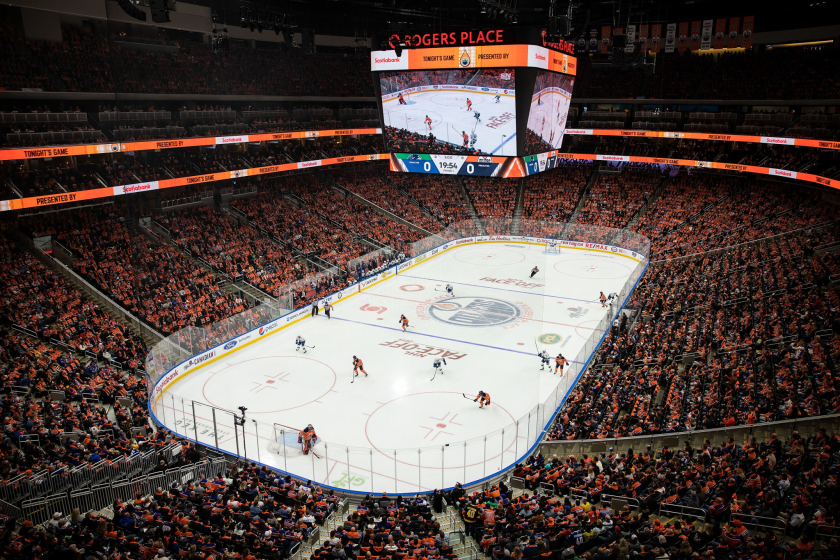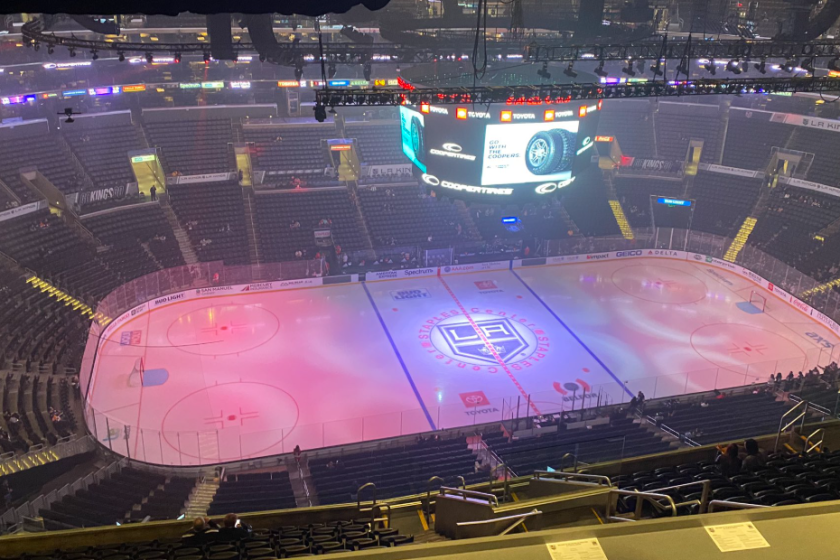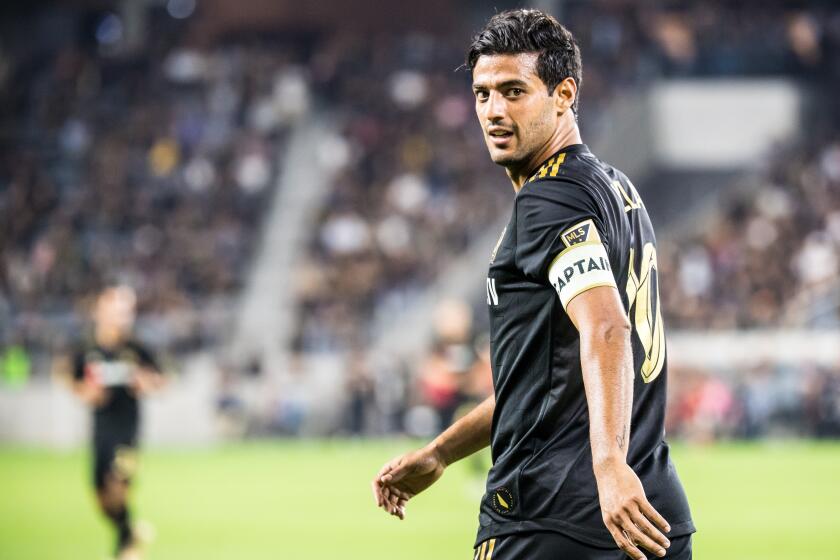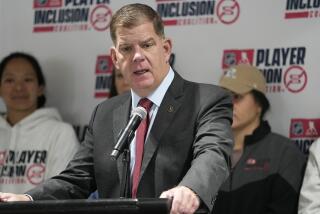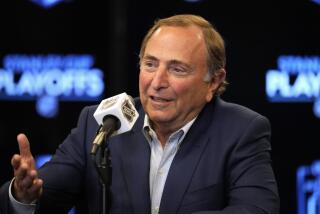COVID-19 pandemic leads to rare harmony in the NHL labor negotiations
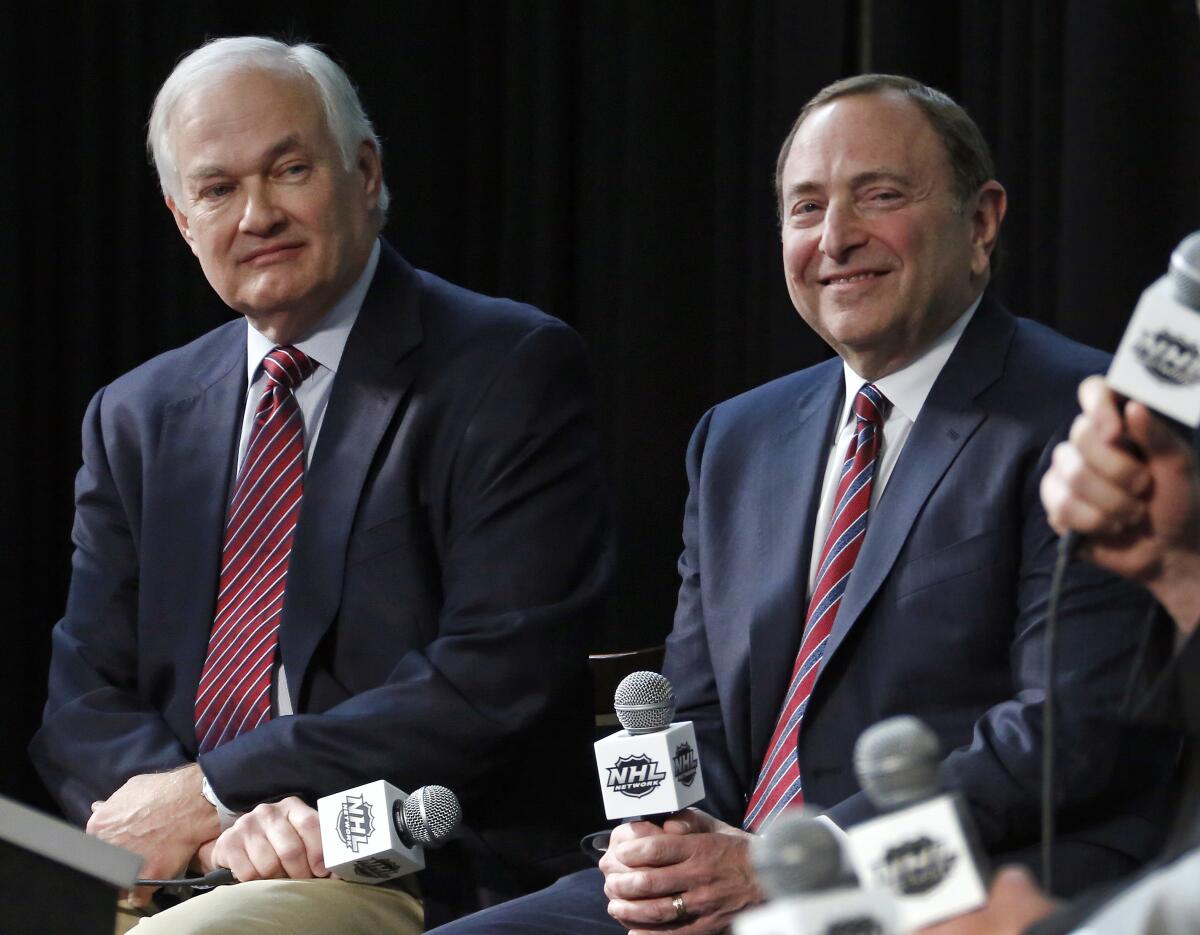
- Share via
The pandemic that brought the NHL and NHL Players’ Assn. together in rare harmony will make it difficult — maybe impossible — for this NHL season to end as they typically do, with a sweaty, bearded team captain lifting the Stanley Cup. But by ratifying return-to-play protocols and a four-year extension of their collective bargaining agreement, the league and the union acknowledged the urgency of minimizing damage inflicted by the COVID-19 outbreak and setting guidelines for what looms as a slow return to economic prosperity.
NHL Commissioner Gary Bettman, who imposed lockouts and canceled a season in his three previous collective bargaining opportunities, acknowledged that these extraordinary times led him and NHLPA Executive Director Donald Fehr to ensure amity until Sept. 15, 2026. They stopped just short of singing “Kumbaya” and virtually holding hands during a webinar news conference Saturday.
“At this point in time, Don and I both recognize that labor peace is something that we couldn’t even quantify how important it was,” Bettman said. “But we both knew that for the business of the game to come back strong and for the game itself to come back strong, there was enough disruption going on in the world that we didn’t have to add to it, which I think made this a collaborative, problem-solving effort more than anything else.”
NHL and NHLPA vote to accept CBA and return to play protocols. Training camps will open next week, and the season will resume Aug. 1.
Noteworthy in their Memorandum of Understanding is that players will defer 10% of their salary next season. The salary cap will stay at $81.5 million until preliminary hockey-related revenues in a just-completed league year surpass $3.3 billion. If preliminary hockey-related revenues are between $3.3 billion and $4.8 billion, the cap will rise to between $81.5 million and $82.5 million. Also, the escrow rate (money deducted from players’ paychecks to ensure an equal split of hockey-related revenues between owners and players) will be capped at 20% next season and will decline progressively.
“The structure here allows these things to be worked out over time so that we hope we’ll be in the very best position possible to get back to normal as soon as possible,” Fehr said. “You have to put the game on the best possible footing to recover as completely as possible as quickly as possible as the economy comes back. And we think we do that.”
The return begins in earnest Monday, when training camps open in the home city of the 24 teams invited to the postseason tournament — a group that doesn’t include the Kings or Ducks. On July 26 the 12 Eastern conference teams will travel to a hub in Toronto and the 12 Western conference teams will go to Edmonton to stay in as protective a bubble as science and human nature allow. After a few exhibition games, competition will resume Aug. 1 with round-robin, non-elimination games among the top four teams in each conference and best-of-five series between the others in each conference.
Fans won’t be allowed in arenas and media presence will be minimal. Asked if crowd noise or music will be piped in, Bettman said NHL events planners “have some very special things planned. You’ll just have to tune in to see them.” Fans will find out soon, with up to six games a day scheduled in the early going.
The league proposed condensing the first two rounds to best-of-five to shorten the timeline but the union wanted to keep each series after the qualifying round at best-of-seven. Schneider, a former Kings defenseman, said players advocated “keeping the integrity and not wanting the asterisk by it in any way shape or form next to the Stanley Cup winner this year.”
Los Angeles will not be chosen as a hub city for the revamped Stanley Cup playoffs, the NHL informed the Kings on Wednesday.
That means the Cup could be awarded Oct. 4, but Bettman doesn’t mind delaying the 2020-21 season. At least empty stands in Edmonton, site of the conference finals and Final, will spare him the jeers he faces each year when he congratulates the new champion. “Looking at the schedule, making some adjustments, we believe we can play a full season and if we run a little later than usual, that may be one of the consequences,” he said. “If we start in December, so be it. We believe that we have the flexibility to do that.”
First, they have to finish this season. That’s not guaranteed despite their decision to decamp to Canada, which has had a lower per capita COVID-19 death rate than the U.S., and despite daily testing and tough policies on cleaning, handwashing and social distancing. More than a half dozen players have opted out of returning, including Calgary defenseman Travis Hamonic, who cited his daughter’s history of respiratory illness, and Boston defenseman Steven Kampfer cited his wife’s and son’s congenital heart defects and heightened risk of COVID-19 complications. Vancouver forward Sven Baertschi said health concerns led him to opt out, a reason echoed by Edmonton defenseman Mike Green. Montreal defenseman Karl Alzner didn’t provide an explanation for opting out. Dallas defenseman Roman Polak had said he would remain in Europe and isn’t on the Stars’ training camp roster. Players have until Monday to opt out.
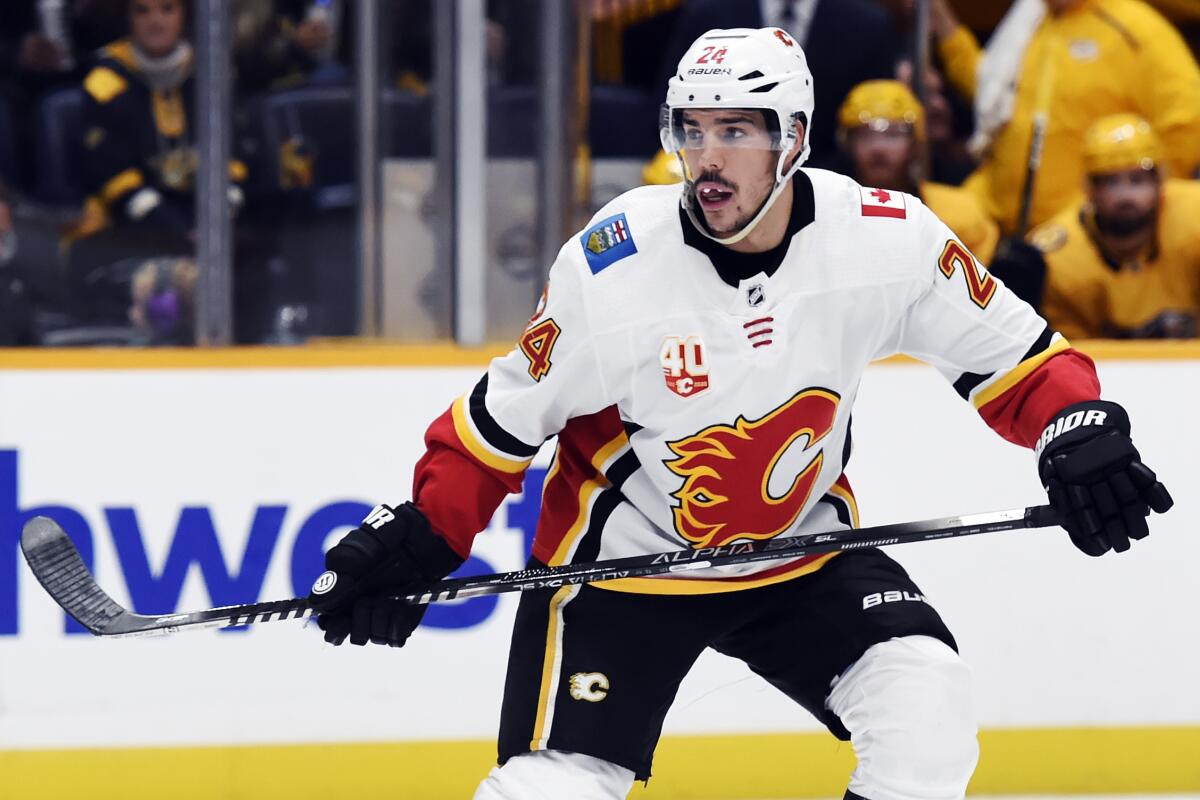
Get accustomed to a lack of explanation about absences: starting with training camp, clubs will be prohibited from disclosing injury and/or illness information. The NHL will provide numbers on COVID-19 tests performed and positive results but won’t identify the player or club. Oh, for those loose-tongued reports about upper- and lower-body injuries. “I think the interests of medical privacy are important and we’re going to protect them,” deputy commissioner Bill Daly said.
Here’s a list of some notable athletes who have decided not to take part in the sports’ restart amid the coronavirus crisis.
Daly also repeated that one positive test won’t cause a shutdown but he couldn’t put a number on the threshold for suspending play. “If we have an outbreak situation it turns into a different judgment at the end of the day,” he said.
The certainty of labor peace for six years feels good. The likelihood of finishing the season feels fragile. “We’re anxious to get going but we all know we’re going to have to make some decisions on the fly, make some changes, and everybody is prepared for that, I think,” Schneider said. And so they’ll hope for the best, and hope that the worst isn’t a player’s severe illness or death in the name of egos or the league’s bottom line.
More to Read
Go beyond the scoreboard
Get the latest on L.A.'s teams in the daily Sports Report newsletter.
You may occasionally receive promotional content from the Los Angeles Times.

